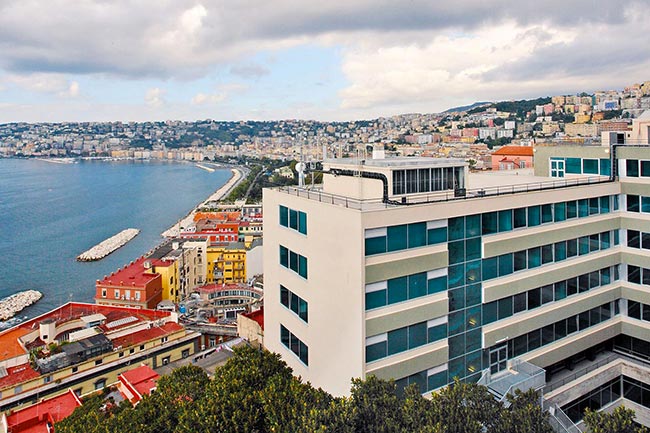Joint Bachelor’s Degree
The SeaBluE Degree is a joint initiative of the SEA-EU Alliance designed to train a new generation of professionals specialised in Sustainable Blue Economy. With an applied orientation within an international and intercultural learning environment, students acquire critical knowledge and skills in marine sciences and resource management, planning, environmental policies, sustainable innovation management and data analysis.
Visit the SeaBluE Degree website for further information and Call for Applications!
Graduates can work as junior sustainability managers in public and private organisations within the Blue Economy, provide technical consultancy or managing quality, environment, and safety. Other opportunities include environmental technicians, planners and analysts in marine resource management, environmental monitoring, and sustainable supply chains across businesses, logistics organizations and ports, research institutes, and regulatory agencies.
The SeaBluE programme is a bachelor’s degree designed to train a new generation of professionals specialised in Sustainable Blue Economy, equipping them with the skills and knowledge necessary to deepen their understanding of the fundamental principles of marine sciences, planning and the sustainable blue economy. Students will learn to critically analyse the challenges and opportunities associated with the economic value of seas and oceans, taking into account the ecological, social, and economic factors involved in their management. They will develop innovative and sustainable solutions that promote industry growth and enhance ocean governance, addressing global sustainability demands. The programme is designed to provide a solid understanding of the marine environment, foster innovation, and promote sustainable economic growth that respects ecological limits.
SeaBluE is a 3-years programme including a mandatory 12-months international mobility period: students will express their preference for the Pathway/Host University for the international mobility during the first year.
During the international mobility in Year 3, the students will attend the Pathways hosted by the Partner Universities:
Pathway 1: Blue Sustainability Accounting, Management and Planning (UPN/UG)
(University of Naples Parthenope, Italy/University of Gdansk, Poland)
Pathway 2: Conservation and Sustainable Use of Marine Resources (UG)(University of Gdansk, Poland)
Pathway 3: Human Impact in the Arctic (NORD)(Nord University, Norway)
Pathway 4: Sustainable Port-Tourism Cities (UNIST)(University of Split, Croatia)
Pathway 5: Blue Management: Accounting, Conservation and Restoration (UCA)(University of Cadiz, Spain)
Pathway 6: Blue Industries: Tourism and Seafood (UAlg/UCA)(University of Algarve, Portugal/University of Cadiz, Spain)
Course Duration: 3 years
Number of Exams: 20
ECTS: 180
Access: maximum 30 students in Naples
Type of Degree: Joint degree, unified and internationally recognised qualification.
Pending accreditation in the national university system.
Degree classification (Italian system):European Approach
Department: Science and Technology and Management and Quantitative Studies
The degree program has been designed as a three-year, highly career-oriented course aimed at building a targeted and specialized skill set. It prepares graduates in Sustainable Blue Economy for direct entry into the job market. Graduates of the program may also choose to continue their university education.
Graduates will acquire a broad knowledge of the fundamental principles of marine sciences, planning and the sustainable blue economy, including the interdependency of marine ecosystems, ocean industries, and societies. Graduates are trained to independently use marine environmental and socio-economic analysis tools, perform data analysis and manage multidisciplinary data.
Graduates will be able to identify and interpret challenges associated with the economic value of the oceans, describe alternative economic approaches, use marine environmental and socio-economic analysis tools, manage multidisciplinary data, provide frameworks for reconciling conflicting uses of ocean resources, analyse policies for sustainable ocean use, and develop awareness of environmental and socio-economic problems related to the blue economy with a focus on sustainability and ethical commitment.
SeaBluE trains professionals capable of applying sustainable planning principles to various sectors of the Blue Economy, through an interdisciplinary knowledge that explores the interface between the marine and maritime environment and the economy in relation to sustainable Blue Economy. The educational path is designed to equip students with the knowledge and skills necessary to perform activities such as: environmental reporting and accounting in the maritime sector, preparing sustainability reports, communicating corporate environmental performance, managing and monitoring resources and environmental processes, providing consultancy on environmental sustainability in port areas, planning and implementing sustainable transition strategies at the corporate or industrial level, offering strategic and operational consultancy in marine and coastal sectors for the Blue Economy, sustainable management of aquaculture activities, environmental impact assessments, and starting entrepreneurial activities and developing new businesses within the Blue Economy.
Admission to the SeaBluE Degree is reserved to selected applicants (max 30 students enrolled at the University of Naples Parthenope). Call for Applications for the joint bachelor’s programme opens at this link https://sea-eu.org/seablue/ and includes all requirements, timeline and criteria for selection.
Documents required. The required documents that need to be uploaded to the application form are the following:

BACHELOR’S DEGREE COURSE COORDINATOR:
Prof.ssa PASQUINELLI Cecilia
cecilia.pasquinelli@uniparthenope.it
seablue.upn@uniparthenope.it

Via Generale Parisi 13 – 80132 Napoli
Centro Direzionale di Napoli, Isola C4 – 80143 Napoli
Università degli Studi di Napoli “Parthenope”
Via Amm. F. Acton, 38 – 80133 Napoli (NA)
P.IVA 01877320638 | C.F. 80018240632
2021 – Università degli Studi di Napoli Parthenope – All Right Reserved